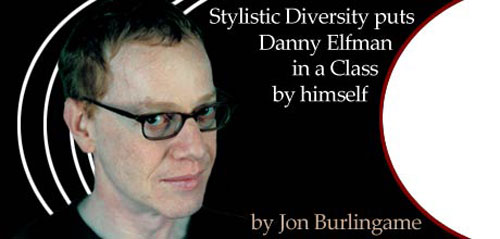Stylistic Diversity puts Danny Elfman in a Class by Himself

Danny Elfman is in the control room at 20th Century-Fox's scoring stage, mixing the main-title music for Men in Black 2, his second big action movie of the summer.
As he listens carefully to the playback of the orchestral track, he paces the floor in his stocking feet, head buried in a score as several technicians await his direction. Intense and specific, he knows what he wants and asks for multiple run-throughs before he gets it.
During a lunch break, the wiry redhead sits down to discuss the honor that clearly leaves him uncomfortable: BMI's Richard Kirk Award for Outstanding Career Achievement. "Maybe I'm supposed to retire or die now," he quips. "I'm flattered. I still feel like an upstart."
| Related News: Top Film, TV, Cable Composers Honored at BMI's Annual Film/TV Awards |
Elfman, 49, is no longer an upstart. He's a well-established composer of movie scores with a Grammy, six other Grammy nominations and two Academy Award nominations to his credit. But what makes him unique - and what caused him to be regarded with suspicion for years by conservatory-trained Hollywood musicians - is that he comes out of rock & roll.
Specifically, he was front man for the highly regarded Los Angeles band Oingo Boingo. And before that, he spent eight years as a founding member of its predecessor, an avant-garde musical theater troupe called the Mystic Knights of the Oingo Boingo. Although he could never have guessed at the time, all of this "street training," as he terms it, turned out to be ideal background for a film composer.
Despite his rock-artist background, some of Elfman's biggest hits have actually been large-scale orchestral scores, often with choral elements: the dark, gothic mystery of Batman (1989), which won him a Grammy; the touching fantasy Edward Scissorhands (1990), with its delicately lyrical passages; the raucous, fun music of Men in Black and the haunting, sensitive score for Good Will Hunting, which earned him dual Oscar nominations in 1997; and the heroic, fast-moving music for this year's blockbuster Spider-Man.
Now, with more than 50 films behind him, Elfman can also point with pride to other projects that have demonstrated his stylistic versatility: the romantic Sommersby (1993), the vaguely English ambiance of Black Beauty (1994), the dissonance of Dolores Claiborne (1995), the urban funk of Dead Presidents (1995), the urgency and '60s-style suspense of Mission: Impossible (1996) and the unsettling, eerie musical effects of A Simple Plan (1998).
"My idol was Bernard Herrmann," Elfman explains, referring to the legendary composer of Citizen Kane and Psycho, "because I felt he could do anything. From day one, I wanted to feel that there was no genre that I couldn't tackle." Growing up, he adds, "the movies were my music school."
Yet he harbored no ambitions to write film music. That is, until director Tim Burton and star Paul Reubens approached him in 1985 to score Pee-wee's Big Adventure. "I thought they were crazy," says Elfman. But it was Elfman's sound they wanted, and the music (very much inspired by another of Elfman's heroes, Italian composer Nino Rota) bounced along with the wacky, offbeat comic's adventures.
Says Burton: "[Danny] brings that intuitive excitement to a project. He's able to understand things people don't understand on the surface and get underneath it, like a silent movie, where you're part of the emotion without overstating it."
Adds Spider-Man director Sam Raimi: "He gently carries the audience to that next place, but he allows them to do the work. He's a genius. That word can't be thrown about, but when you listen to his music and the diversity of it and how successful it is with the images, I don't know if there's a better word to describe him."
And although few people in movies mention it, Elfman's television themes are equally popular, especially the long-running theme for Fox's The Simpsons. "He was a natural, he's brilliant," says creator Matt Groening.
Elfman says that he often spends "three or four weeks, just banging away," in an attempt to find the right mood for a score. "If I can capture the tone for two or three scenes that are very important to the movie, but very different to one another, I have it," he says. "Then suddenly I'll go into hyperdrive and do the rest of the film in three or four weeks."
With Brett Ratner's Red Dragon on his agenda for later this year, Elfman says he plans to lighten the load, trimming back to "one big film a year, and leave myself open to a small one." Ever the maverick, he hopes to expand his musical horizons to encompass ballet (Edward Scissorhands, for London choreographer Matthew Bourne) and possibly a concerto ("I definitely want to get into pure orchestra," he says).
As for film, he says he keeps searching for the ideal project: "Looking for the chance to do something fresh, that canvas, that movie that will really allow a score to be special. You just have to keep doing it. You hope for that rare opportunity to do something wonderful and original."
Photo: Livia Corona






Community
Connect with BMI & Professional Songwriters